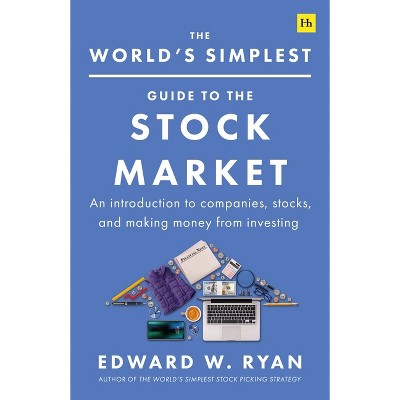Sponsored

The 21st-Century Case for a Managed Economy - by Sean Harkin (Paperback)
$29.99
In Stock
Eligible for registries and wish lists
Sponsored
About this item
Highlights
- This book argues that the scientific concept of feedback - the idea that change in some element of a system can cause further change in that element - represents a general concept of economic change.
- Author(s): Sean Harkin
- 276 Pages
- Business + Money Management, Finance
Description
About the Book
In this work, Harkin applies the concept of feedback to economic theory and economic policy. The author supports the common-sense idea that a well-functioning economy requires a mixed economic system in which the role of the state is almost as great as that of the market.Book Synopsis
This book argues that the scientific concept of feedback - the idea that change in some element of a system can cause further change in that element - represents a general concept of economic change. Positive feedback causes runaway change, such as a market bubble, inflation or long-run growth, while negative feedback causes stability and stasis. Emphasising both kinds of feedback stands in contrast to the equilibrium theories of classical economics which, in effect, emphasise negative feedback only. In practical terms, the feedback perspective implies a need for extensive government involvement in the economy to suppress undesirable feedback effects - such as those causing wild instability or self-perpetuating inequality - while supporting desirable feedback effects - such as those causing economic growth. -------------------- For decades, free-market economists have told a consistent story. Markets are rational, efficient, stable and fair, and even volatile financial markets should be left mostly to their own devices. The economic crisis that began in 2007 has, however, disproven such belief in the perfection of markets. The reason market fundamentalism fails is simple: it is built on economic theories that incorporate only one half of how the economy actually operates. These theories focus on a concept of long-run equilibrium that sees the economy as being continually drawn back to balance after any change from this position, in a form of what scientists would call negative feedback. However, there is also positive feedback; a process whereby a given change amplifies itself until the system is driven far from equilibrium, and this phenomenon is equally visible in the economy. Positive feedback drives economic growth, speculative bubbles, inflation, recessions, deflation and self-perpetuating inequality. It is what gives us the secular trends and cyclical fluctuations we observe in the real economy. And it deserves to be a central part of our economic theory. This book makes a first attempt at applying the concept of feedback to economic theory and economic policy. It recognises that the state must support desirable feedbacks while suppressing undesirable ones. But it also recognises that central planning leads to oppression and inefficiency. This leads us back to the common-sense idea of a mixed economic system in which the role of the state is almost as great as that of the market.Dimensions (Overall): 9.26 Inches (H) x 6.2 Inches (W) x .78 Inches (D)
Weight: .89 Pounds
Suggested Age: 22 Years and Up
Number of Pages: 276
Genre: Business + Money Management
Sub-Genre: Finance
Publisher: Harriman House
Theme: General
Format: Paperback
Author: Sean Harkin
Language: English
Street Date: May 25, 2010
TCIN: 1006853887
UPC: 9781906659547
Item Number (DPCI): 247-41-2006
Origin: Made in the USA or Imported
If the item details aren’t accurate or complete, we want to know about it.
Shipping details
Estimated ship dimensions: 0.78 inches length x 6.2 inches width x 9.26 inches height
Estimated ship weight: 0.89 pounds
We regret that this item cannot be shipped to PO Boxes.
This item cannot be shipped to the following locations: American Samoa (see also separate entry under AS), Guam (see also separate entry under GU), Northern Mariana Islands, Puerto Rico (see also separate entry under PR), United States Minor Outlying Islands, Virgin Islands, U.S., APO/FPO
Return details
This item can be returned to any Target store or Target.com.
This item must be returned within 90 days of the date it was purchased in store, shipped, delivered by a Shipt shopper, or made ready for pickup.
See the return policy for complete information.
Frequently bought together
Trending Non-Fiction

$15.68
Buy 1, get 1 50% off select books
4.8 out of 5 stars with 204 ratings

Highly rated
$19.31
was $20.98 New lower price
Buy 1, get 1 50% off select books
4 out of 5 stars with 67 ratings

$18.28
was $19.58 New lower price
Buy 1, get 1 50% off select books
4.7 out of 5 stars with 17 ratings

$4.59
MSRP $7.99
Buy 1, get 1 50% off select books
4.8 out of 5 stars with 124 ratings

$6.20
MSRP $10.95
Buy 1, get 1 50% off select books
4.8 out of 5 stars with 33 ratings

$7.09
MSRP $9.99
Buy 1, get 1 50% off select books
4.9 out of 5 stars with 46 ratings
Discover more options

$10.99 - $25.99
MSRP $19.99 - $35.00 Lower price on select items
Buy 1, get 1 50% off select books
5 out of 5 stars with 21 ratings










